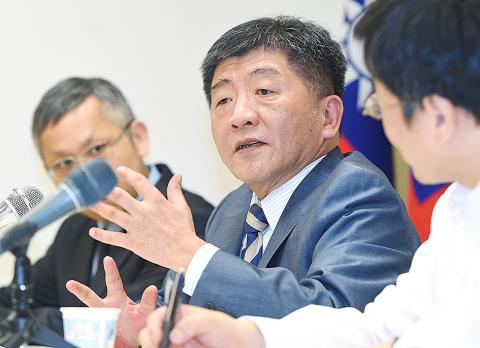Despite the lack of an official invitation, a Taiwanese delegation is to leave at midnight tomorrow for the World Health Assembly (WHA) in Geneva, Switzerland, the Ministry of Health and Welfare said yesterday.
The government will work with health and medical associations from around the world to host forums outside the assembly meeting that focus on issues related to antibiotic resistance, dental care for elderly patients and strengthening healthcare systems, said Minister of Health and Welfare Chen Shih-chung (陳時中), who is to lead the delegation.
The topic of this year’s WHA meeting is universal health coverage and as Taiwan is a world leader in universal health coverage, it us to jointly host with the World Medical Association a forum on the topic, he said.

Photo: Liao Chen-huei, Taipei Times
Chen also responded to a statement by China’s Taiwan Affairs Office yesterday, which said that Taiwan did not receive an invitation because the Democratic Progressive Party government refuses to acknowledge the so-called “1992 consensus,” and accused Taiwan of “playing the sympathy card” to gain support from other nations.
“We are going to the WHA to make contributions and are not playing the ‘sympathy card,’” Chen said. “We are playing the ‘anger’ and ‘soft power’ cards. [China] should not use politics to harm the interests of Taiwanese.”
The “1992 consensus” refers to a tacit understanding between the Chinese Nationalist Party (KMT) and the Chinese Communist Party that there is “one China,” with each side having its own interpretation as to what “China” means.
The government is dissatisfied and disappointed at the lack of an invitation, Chen said, adding that the nation’s allies are to make strongly worded statements at the assembly to protest the decision to exclude Taiwan.
Nevertheless, the delegation would seek to have more exchanges with healthcare officials worldwide to teach more nations about Taiwan’s medical achievements, Chen said.
Although Taiwan is not a WHO member, it would score 85 points on the organization’s public risk indicator, which would place it in the same category as Japan, South Korea, Canada, Singapore and other nations with quality healthcare systems.
“If I run into the WHO secretary-general this year, I will directly ask him why his organization decided to disregard the health of 23 million Taiwanese,” Chen said.

US President Donald Trump yesterday announced sweeping "reciprocal tariffs" on US trading partners, including a 32 percent tax on goods from Taiwan that is set to take effect on Wednesday. At a Rose Garden event, Trump declared a 10 percent baseline tax on imports from all countries, with the White House saying it would take effect on Saturday. Countries with larger trade surpluses with the US would face higher duties beginning on Wednesday, including Taiwan (32 percent), China (34 percent), Japan (24 percent), South Korea (25 percent), Vietnam (46 percent) and Thailand (36 percent). Canada and Mexico, the two largest US trading

AIR SUPPORT: The Ministry of National Defense thanked the US for the delivery, adding that it was an indicator of the White House’s commitment to the Taiwan Relations Act Deputy Minister of National Defense Po Horng-huei (柏鴻輝) and Representative to the US Alexander Yui on Friday attended a delivery ceremony for the first of Taiwan’s long-awaited 66 F-16C/D Block 70 jets at a Lockheed Martin Corp factory in Greenville, South Carolina. “We are so proud to be the global home of the F-16 and to support Taiwan’s air defense capabilities,” US Representative William Timmons wrote on X, alongside a photograph of Taiwanese and US officials at the event. The F-16C/D Block 70 jets Taiwan ordered have the same capabilities as aircraft that had been upgraded to F-16Vs. The batch of Lockheed Martin

GRIDLOCK: The National Fire Agency’s Special Search and Rescue team is on standby to travel to the countries to help out with the rescue effort A powerful earthquake rocked Myanmar and neighboring Thailand yesterday, killing at least three people in Bangkok and burying dozens when a high-rise building under construction collapsed. Footage shared on social media from Myanmar’s second-largest city showed widespread destruction, raising fears that many were trapped under the rubble or killed. The magnitude 7.7 earthquake, with an epicenter near Mandalay in Myanmar, struck at midday and was followed by a strong magnitude 6.4 aftershock. The extent of death, injury and destruction — especially in Myanmar, which is embroiled in a civil war and where information is tightly controlled at the best of times —

China's military today said it began joint army, navy and rocket force exercises around Taiwan to "serve as a stern warning and powerful deterrent against Taiwanese independence," calling President William Lai (賴清德) a "parasite." The exercises come after Lai called Beijing a "foreign hostile force" last month. More than 10 Chinese military ships approached close to Taiwan's 24 nautical mile (44.4km) contiguous zone this morning and Taiwan sent its own warships to respond, two senior Taiwanese officials said. Taiwan has not yet detected any live fire by the Chinese military so far, one of the officials said. The drills took place after US Secretary